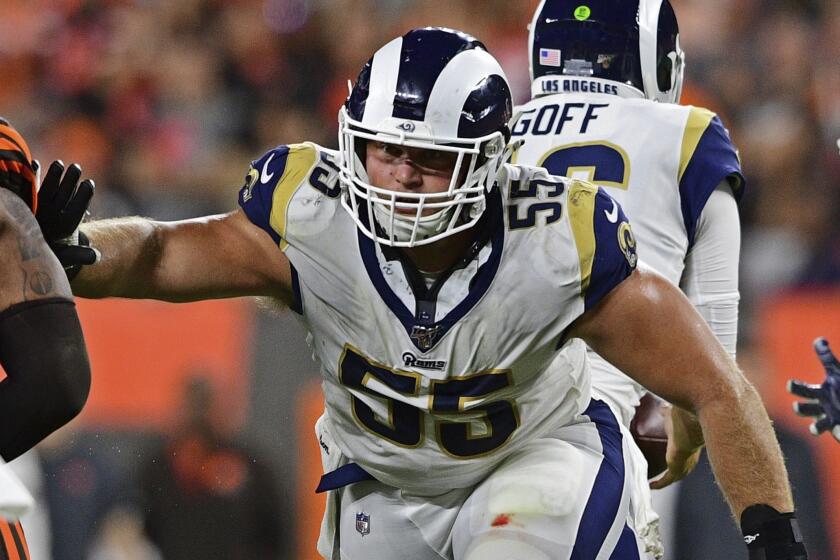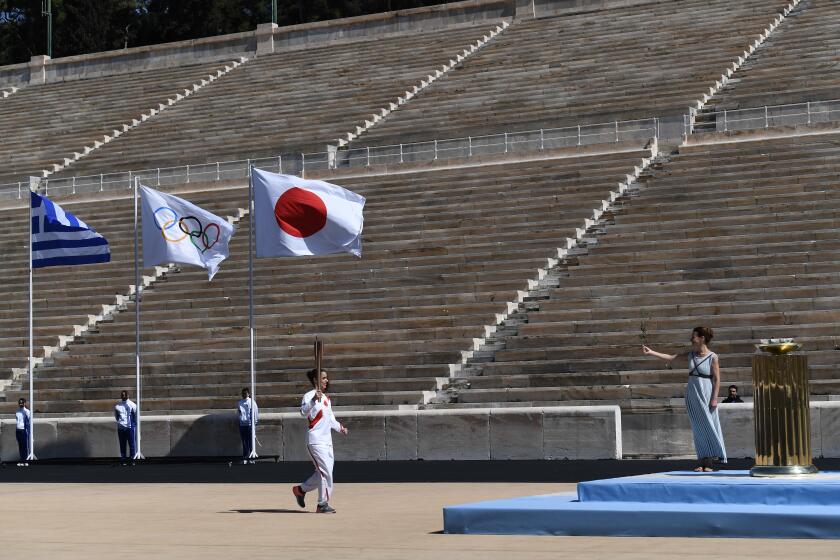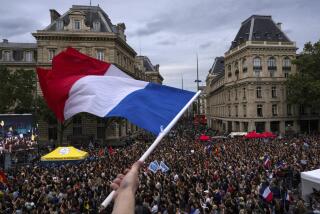U.S. Olympic officials preparing for ‘variety of outcomes’
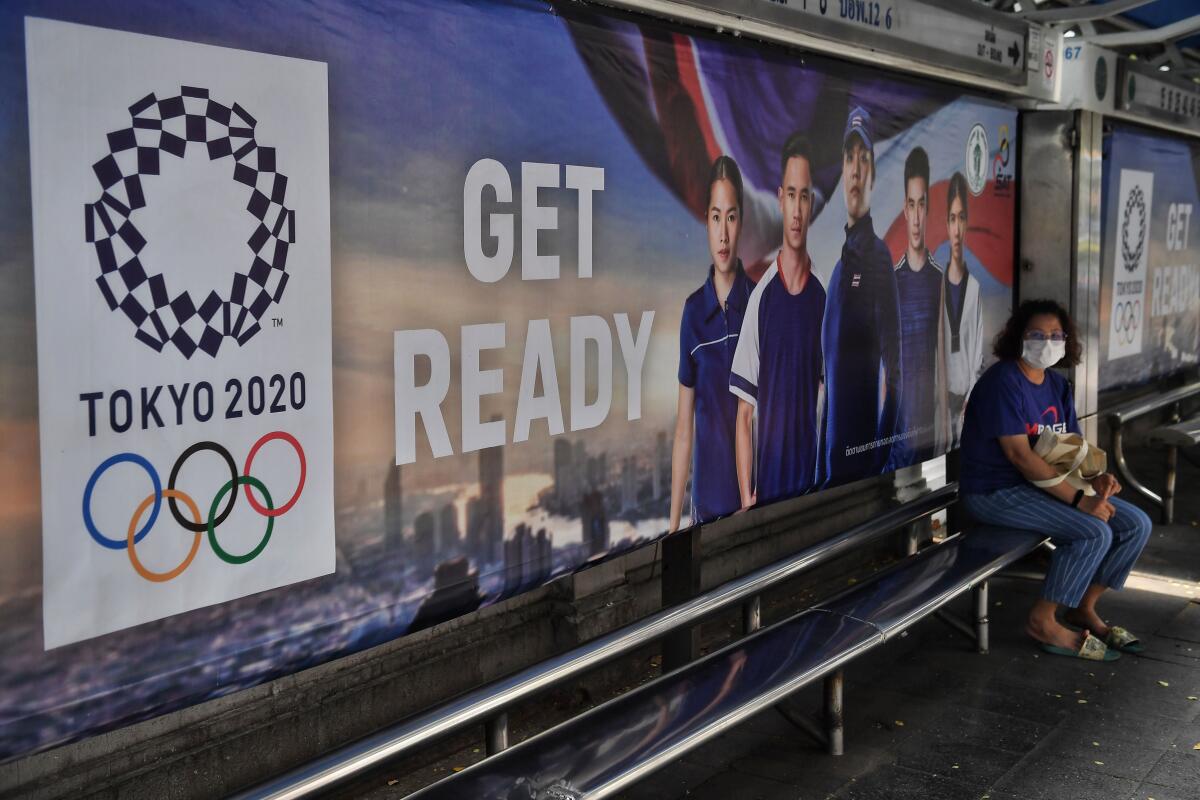
- Share via
The last few days have seen a subtle but important shift in tone as Olympic leaders and Japanese officials discuss the upcoming 2020 Summer Games in Tokyo.
While insisting there is still time to make a decision, they have softened their language about pressing full-speed ahead and are beginning to talk about contingencies that could potentially include postponement or cancellation.
During a Friday teleconference, U.S. Olympic & Paralympic Committee executives acknowledged they are preparing for “a variety of outcomes” should the coronavirus pandemic force a change in plans.
“In this time of extreme anxiety, many of us and certainly athletes are incredibly confused and facing an enormous amount of ambiguity as to what may come this summer,” chief executive Sarah Hirshland said.
Her concerns reflect a growing unease in the global Olympic movement as Tokyo’s scheduled July 24 opening ceremony draws nearer.
A look at athletes, coaches and others in the sports world who have tested positive of the coronavirus.
USA Swimming published a letter Friday afternoon urging the USOPC to “use its voice and speak up for the athletes” by calling for a one-year postponement.
This followed an interview in which IOC President Thomas Bach told the New York Times that, while canceling the Games is not in his plans, he and his members are “not living in a bubble or on another planet.”
“We don’t know what the situation will be,” Bach said. “Of course, we are considering different scenarios, but we are contrary to many other sports organizations or professional leagues in that we are 4 1/2 months away from the Games.”
As a former Olympic fencer and gold medalist who missed the 1980 Summer Games in Moscow because of a multi-nation boycott, Bach has said he knows how badly athletes want to compete. He declined to elaborate on any of the contingencies being weighed, dismissing such talk as speculation.
Earlier in the week, Japanese Prime Minister Shinzo Abe seemed to leave the door open for postponement when stating that he wanted to “hold the Olympics and Paralympics perfectly.”
Japan has yet to decide on holding the Summer Olympics amid the coronavirus outbreak, President Trump said after a conference call with Prime Minister Shinzo Abe.
Hirshland put it another way: “This is and will likely continue to be a work in progress as the environment continues to evolve.”
Postponing the Summer Games would be doable but extremely complex. The international federations that govern each sport have already named host cities and secured venues for world championships throughout much of next year. Broadcasters who paid billions for rights might not like to have the Olympics plopped down in the middle of football or soccer season.
Athletes who carefully map their training sometimes years in advance have to adjust.
But everyone’s hand might be forced by a COVID-19 pandemic that, so far, has infected more than 266,000 people, with more than 11,000 deaths, worldwide.
Five American athletes — all winter sports competitors — have been quarantined, said Dr. Jonathan Finnoff, the USOPC chief medical officer. Two were tested after developing symptoms; one test came back negative and the other is pending.
“We have a lot of procedures and guidelines in place,” Finnoff said.
The coronavirus has caused Olympic qualification events to be postponed or canceled around the globe, leading to uncertainty about how national teams and the IOC will select which athletes get to compete.
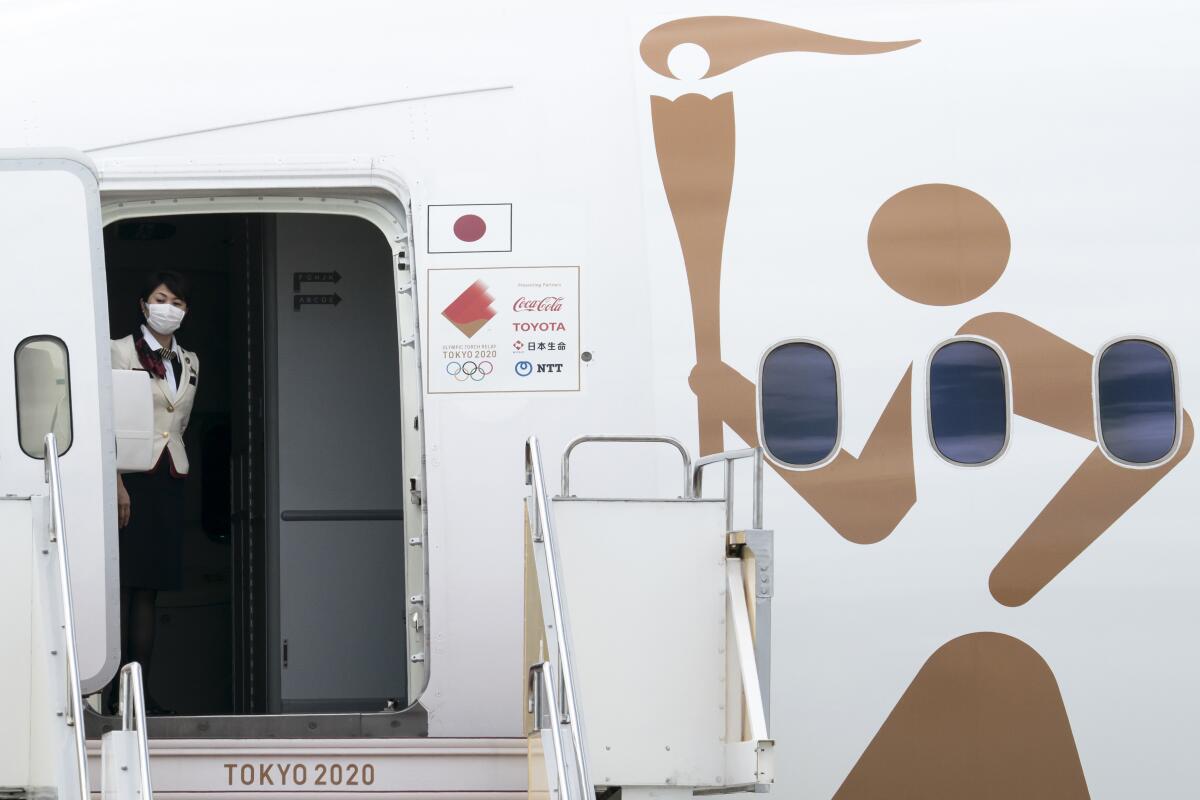
Training is another problem. Though Bach repeatedly has encouraged athletes to continue with their preparations, governments in many countries — as well as parts of the U.S. — have shuttered pools, gyms and tracks.
National officials in Italy, France and Britain have expressed worries. The USOPC has closed all but the living quarters at its training centers in Colorado and New York.
“First and foremost, we are clearly encouraging athletes to put their safety and the safety of the people in their community first and to follow the guidance of local health officials above and beyond everything else,” Hirshland said.
Response from those athletes has been varied, she said, often depending on where athletes live in the U.S. On Thursday, swimmer Jacob Pebley, who trains in Southern California, called for a postponement.
“How can we, members of Team USA and role models for hundreds of thousands of young athletes, attend Olympic Trials/the Olympics in good conscience?” he posted on social media. “To do so would fly in the face of all emerging evidence and best practices for social distancing and protecting the health of vulnerable communities.”
Others, however, are eager to compete despite the circumstances.
“There are athletes out there for whom this feels like their only opportunity, their one chance,” Hirshland said.
Opinions seem to be equally mixed in Japan, where the Olympic flame arrived by plane from Greece on Friday.
In a brief ceremony at Matsushima Air Base, Tokyo 2020 President Yoshiro Mori reportedly mentioned the “difficult situation” and said his organizing committee is consulting with the World Health Organization to “ensure a safe and secure Games.”
But the Japanese news agency Kyodo published a survey earlier in the week showing that nearly 70% of respondents do not expect the Games to go off as scheduled.
In the history of the modern Olympics, the Games have been canceled on only three occasions, all because of world wars. That includes 1940 in Tokyo.
At this point, many international federations and national Olympic committees are continuing to support a wait-and-see approach for this summer. They remain in consultation with public health agencies.
“Our Games aren’t two weeks from now. They are four months from now,” USOPC chair Susanne Lyons said. “We are allowing the IOC to gather that advice.”
Hirshland acknowledged that it is difficult to be patient with so much anxiety among athletes and national officials.
“There is a high degree of uncertainty and a lack of clarity, and we absolutely want to have clarity as soon as it is practical,” she said. “I don’t know if there is an answer in this that will provide ease for everyone.”
More to Read
Go beyond the scoreboard
Get the latest on L.A.'s teams in the daily Sports Report newsletter.
You may occasionally receive promotional content from the Los Angeles Times.

